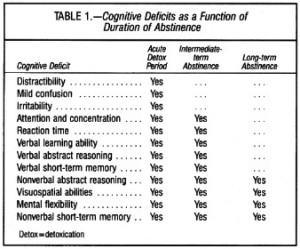The presence of some brain dysfunction is common with recovering alcoholics/addicts. Some studies have suggested that 71% to 96% of individuals perform in the impaired range of various psychological tests. McGrady and Smith in a 1986 article, “Implications of Cognitive Impairment for the Treatment of Alcoholism,” said: “Given the bulk of evidence, it is reasonable to conclude that cognitive impairment is a concomitant of alcoholism.” An “Alcohol Alert” by the National Institute on Alcohol Abuse and Alcoholism (NIAAA) indicated that even mild to moderate drinking could affect cognitive functioning. But although it stood to reason that cognitive impairment could impede recovery, “evidence has not conclusively shown this to be the case.”
However, a study by Fein et al., “Cognitive Impairments in Abstinent Alcoholics,” published in Addiction Medicine found: “The most significant determinant of the presence of cognitive deficits in persons recovering from alcoholism is the time elapsed since their last drink.” When the time period was controlled, different patterns emerged. They classified the abstinence time into three time periods. The acute detoxification period could last as long as the first two weeks of abstinence. The intermediate abstinence period was from the end of the detoxification time through the first two months. The long-term abstinence period extended from two months to five years of abstinence. The general pattern of deficits in these three time periods is shown within Table 1 taken from Fein et al.
Alcohol use has well-documented effects on attention, concentration, reaction time, motor coordination, motor speed, judgment, problem solving, learning and short-term memory. Because these impairments are substantially reduced with detoxification, neuropsychological testing during this time period is of little value. “It is the residual deficits in patients following detoxification that are relevant to the diagnosis of cognitive impairment.”
Fein et al. stated that sensitivity to the possibility of cognitive impairments in abstinent alcoholics was essential to informed treatment planning. Individuals with deficits to learn new information were at a disadvantage in intensive treatment programs. They could be seen as “unmotivated” or “not ready to stop drinking” rather than “impaired.” They suggested early treatment focus on enforced abstinence and be supportive, rather than make the patients learn new material or think analytically about their experience. As cognitive functioning improves, these patients may begin to participate in the more educational and insight-oriented aspects of treatment.
We note that the Alcoholics Anonymous program is appropriate to the cognitive limitations of newly abstinent alcoholic persons. The focus in Alcoholics Anonymous is on maintaining abstinence from alcohol within the context of acceptance and support. New initiates are told to come to as many meetings as possible (“90 meetings in 90 days”), with- out an expectation that they become fully indoctrinated into the culture of the program (“fake it until you make it”). Indeed, during the initial period, the emphasis is on behavioral change rather than on understanding or a change of attitude.
The apparent discrepancy between the NIAAA statement and the Fein et al. study may be explained by an observation made by Terence Gorski of how symptoms of post acute withdrawal (PAW) associated with the brain dysfunction from alcohol/drug use may contribute to many cases of relapse. According to Gorski, “Post acute withdrawal is a group of symptoms of addictive disease that occur as a result of abstinence from addictive chemicals.” Too often these “sobriety-based symptoms” of alcoholism and drug addiction are neglected or ignored. See “Recognizing Your PAWS” for more information on PAW symptoms. Or you can read Gorski’s Comprehensive Guide to PAW here.
PAW symptoms are not the same in everyone. There can be a wide variance from person to person in how severe they are, how often they occur and how long they last. Gorski suggested there were four patterns in PAW symptoms. If they get better over time, that is a regenerative pattern. If they get worse, he says it is degenerative. If it stays the same, that is a stable pattern. If it comes and goes, that is an intermittent pattern.
The most common pattern of PAW is regenerative and over time it becomes intermittent. It gradually gets better until the symptoms disappear and then it comes and goes. The first step is to bring PAW symptoms into remission. This means bringing them under control so that you are not experiencing them at the present time. Then the goal is to reduce how often they occur, how long the episode lasts, and how bad the symptoms are. You must remember that even when you are not experiencing them there is always the tendency for them to recur. It is necessary to build a resistance against them – an insurance policy that lowers your risk.
Stress triggers and intensifies PAW symptoms. Conversely, lower stress means less severe PAW. So learning to manage stress will help you manger PAW. Mindfulness meditation has been shown to be very effective in reducing stress levels. In How God Changes Your Brain, Andrew Newberg and Mark Waldman noted that animal studies have shown how mild, short-term or chronic stress impairs memory by disrupting dendritic activity. “If the situation that is causing the stress is removed, function is restored.” Intentional relaxation, as with deliberately scanning each part of your body to reduce muscular tension and fatigue will not only relieve bodily tension, it will interrupt the release of stress-stimulating neurochemicals.
When all is said and done, you are responsible for protecting yourself from anything that threatens your sobriety or anything that triggers post acute withdrawal symptoms. Reducing the stress resulting from and contributing to the symptoms of post acute withdrawal must be of prime consideration for you. You must learn behavior that will protect you from the stress that might put your sobriety in jeopardy.
Good nutrition plays a role in stress reduction and managing PAW. Gorski suggests a high protein, complex carbohydrate meal plan. Eat three well-balanced meals daily. Eat three nutritious snacks to stave off hunger, which is a stress producer. Potato chips, candy and other high calorie low nutrient foods are no-nos. Avoid foods high in sugar and limit your caffeine intake. Also use multiple vitamins, vitamin B-12 and broad-spectrum amino acids.
Regular aerobic exercise helps to reduce stress. “Many recovering people will testify to the value of exercise in reducing the intensity of PAW symptoms. After they exercise they feel much better, find it easier to concentrate and remember, and are able to be more productive.” Exercise will stimulate the release of neurochemicals that help relieve pain, anxiety and tension.
In The Emperor’s New Clothes, Irving Kirsch reported that studies of physical exercise as a treatment for depression have shown several surprising findings. Exercise is more beneficial for moderate to severe depression than it is for mild to severe depression. These benefits seem to be long lasting, if the person continues to exercise regularly. Twenty minute three days per week is enough to produce the antidepressant effect. But Gorski suggests daily exercise because of its added value in reducing stress.
According to Gorski, spirituality is an important tool in managing PAW symptoms. “Through spiritual development you can develop new confidence in your own abilities and develop a new sense of hope.” Using the principles of the AA/NA program to increase your conscious contact with your higher power is an important part of this spiritual development. You simply have to be open to the possibility of a Higher Power and be open to experimenting with a form of communication with that Power. There isn’t a required structure to that communication.
Try reading Greenberg’s and Waldman’s book, How God Changes Your Brain for suggestions on how meditation can be practiced from a nonreligious point of view. Greenberg has done research that has showed neurological changes in the brains of praying nuns that was nearly the same as that in the brains of Buddhist monks meditating. This evidence confirmed their hypothesis that the benefits gleaned from prayer and meditation may have less to do with a specific theology “than with the ritual techniques of breathing, staying relaxed, and focusing one’s attention upon a concept that evokes comfort, compassion, or a spiritual sense of peace.”
A final area in managing PAW is living a balanced life. “It means your are healthy physically and psychologically and that you have healthy relationships.” You have time for your job, your family, and your friends, as well as your own growth and recovery. It also means wholesome living. It needs a strong social network that nurtures you and encourages a recovery-oriented lifestyle. The two primary goals in any person’s recovery are to establish and maintain a recovery-oriented lifestyle and to establish and maintain a sober support system.
It [balanced living] means having a balance between work and play, between fulfilling your responsibilities to other people and your need for self-fulfillment. It means functioning as nearly as possible at your optimum stress level, maintaining enough stress to keep you functioning in a healthy way and not overloading yourself with stress so that it becomes counterproductive. With balanced living, immediate gratification as a lifestyle is given up in order to attain fulfilling and meaningful living.
I have read and used Terence Gorski’s material on relapse and recovery for most of my career as an addictions counselor. I’ve read several of his books and booklets; and I’ve completed many of his online training courses. He has a blog, Terry Gorski’s Blog, where he graciously shares much of what he has learned, researched and written over the years. This is one of a series of articles based upon the material available on his blog and website.


